Wil Srubar News
 At CU Boulder’s Living Materials Lab, Professor Wil Srubar is developing “bioblocks” made from microalgae that use sunlight, seawater and carbon dioxide to grow carbon-negative limestone—offering a sustainable alternative for use in concrete, cement and other building materials.
At CU Boulder’s Living Materials Lab, Professor Wil Srubar is developing “bioblocks” made from microalgae that use sunlight, seawater and carbon dioxide to grow carbon-negative limestone—offering a sustainable alternative for use in concrete, cement and other building materials. Professor Wil Srubar is the principal director of the Living Materials Laboratory, where an interdisciplinary team develops nature-inspired concrete alternatives that can be produced without fossil fuels or significant carbon emissions.
Professor Wil Srubar is the principal director of the Living Materials Laboratory, where an interdisciplinary team develops nature-inspired concrete alternatives that can be produced without fossil fuels or significant carbon emissions.
 CEAE is hosting five conferences, this summer and beyond. Please join us!
CEAE is hosting five conferences, this summer and beyond. Please join us!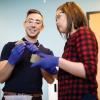 Wil Srubar's aim is to break the reliance on fossil fuels in concrete production by developing a nature-inspired alternative that eliminates the need for fossil fuels and significantly reduces carbon emissions.
Wil Srubar's aim is to break the reliance on fossil fuels in concrete production by developing a nature-inspired alternative that eliminates the need for fossil fuels and significantly reduces carbon emissions.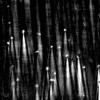 CU Boulder’s Living Materials Laboratory contributed to groundbreaking research showing how engineered microbes can create bioglass microlenses, paving the way for advanced imaging technologies in medicine and materials science.
CU Boulder’s Living Materials Laboratory contributed to groundbreaking research showing how engineered microbes can create bioglass microlenses, paving the way for advanced imaging technologies in medicine and materials science.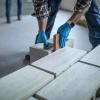 Prometheus Materials, a zero-carbon building materials company spun out of the labs of Wil Srubar, Mija Hubler and Sherri Cook, along with partner groups will receive $10 million from the DOE to study the removal of carbon dioxide from cement.
Prometheus Materials, a zero-carbon building materials company spun out of the labs of Wil Srubar, Mija Hubler and Sherri Cook, along with partner groups will receive $10 million from the DOE to study the removal of carbon dioxide from cement. Professor Wil Srubar has been appointed as CU Boulder’s first Deming Associate Dean for Innovation & Entrepreneurship. This newly created role will focus on fostering innovation by providing education, mentorship and resources to faculty, postdoctoral researchers and graduate students to drive the commercialization of intellectual property.
Professor Wil Srubar has been appointed as CU Boulder’s first Deming Associate Dean for Innovation & Entrepreneurship. This newly created role will focus on fostering innovation by providing education, mentorship and resources to faculty, postdoctoral researchers and graduate students to drive the commercialization of intellectual property.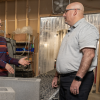 CU Boulder faculty developed an eco-friendly cement that emits little to no carbon dioxide and recycles 95 percent of its water. In 2021, they commercialized it as Prometheus Materials. The company produces bio-concrete using blue-green algae, mimicking natural processes that form seashells and coral reefs.
CU Boulder faculty developed an eco-friendly cement that emits little to no carbon dioxide and recycles 95 percent of its water. In 2021, they commercialized it as Prometheus Materials. The company produces bio-concrete using blue-green algae, mimicking natural processes that form seashells and coral reefs.
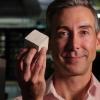 Wil Srubar, associate professor in Building Systems Engineering and the Materials Science and Engineering Program, was chosen from more than 58 applicants for his research trajectory to further redefine the boundaries of living architecture — both on Earth and beyond.
Wil Srubar, associate professor in Building Systems Engineering and the Materials Science and Engineering Program, was chosen from more than 58 applicants for his research trajectory to further redefine the boundaries of living architecture — both on Earth and beyond.
- Forbes Magazine is featuring groundbreaking research conducted by faculty members at CU Boulder in the field of eco-friendly concrete.Cement is a significant contributor to carbon emissions, responsible for about eight percent of global output.


